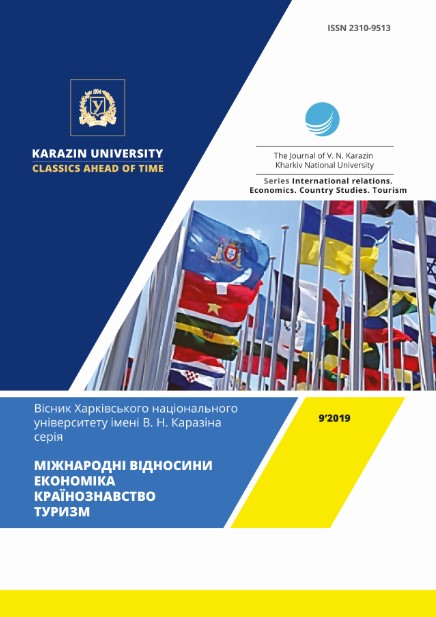Prospects for improving technology in non-conventional energy development
Abstract
This article discusses the prospects for the development of the implementation of scientific and technical cooperation (STC). On the example of interstate cooperation between Ukraine and Chile, there are approaches to improving the procedure for developing cooperation priorities. The current state of these relations does not reflect real trends in the development of international economic relations (IER) in the vector of strengthening the scientific and technical component. The subject of research of the article is formation of scientific and technical cooperation priorities between Ukraine and Chile. The goal is to develop the approaches of foreground international economic relations formation in relation to the conditions in relation to the conditions of Ukraine and corresponding to the needs of overcoming crisis socio-economic phenomena based on the intensification of scientific and technical cooperation.The objective is to research the dynamics of the actual non-conventional energy production as one of the priority areas of cooperation between Ukraine and Chile. As part of this study, theoretical, methodological and system-logical methods for analyzing primary sources are used, including statistical materials, regulatory documents, scientific publications for descriptive and structural analysis to assess the initial state of international economic relations primary level and methods for forming trends in their development prospects. The following results were obtained: on the basis of phased analysis of the priorities formation for the development of Ukraine, was proposed an approach for analyzing the similarity of the integrated development of national economies. Conclusions: the results of the analysis allowed in the framework of interstate cooperation between Ukraine and Chile to highlight the promising area of development of non-traditional renewable energy.
Downloads
References
Babenko, V., Chebanova, N., Ryzhikova, N., Rudenko, S, &Birchenko, N. (2018). Research into the process of multi-level management of enterprise production activities with taking risks into consideration.European Journal of Enterprise Technologies, No 3 (91). Vol. 1. DOI: 10.15587/1729-4061.2018.123461
Babenko, V., Nazarenko, O., Nazarenko, I.,&Mandych, O. (2018). Aspects of program control over technological innovations with consideration of risks. Eastern-European Journal of Enterprise Technologies, Vol. 3/4 (93). DOI: 10.15587/1729-4061.2018.133603
Sidorov, V., Babenko, V., & Bondarenko, M. (2017). Researching factors of innovative activities of agrarian business of Ukraine under globalization of the world economy. Innovative technologies and scientific solutions for industries, No 2 (2). DOI: https://doi.org/10.30837/2522-9818.2017.2.070
Dyuzhev, V. (2012). Organizational and economic problems of increasing innovative sustainability to technologies of non-traditional renewable energy in Ukraine. Kharkiv: TsifrovayaTipografiya.
Babenko, V., Alisejko, E., &Kochuyeva, Z. (2017). The task of minimax adaptive management of innovative processes at an enterprise with risk assessment.Innovative technologies and scientific solutions for industries, No 1 (1). DOI: https://doi.org/10.30837/2522-9818.2017.1.006
Matyushenko, I., Berenda, S., &Reznikov, V. (2015). European integration of Ukraine in the system of international economic integration. Retrieved from https://www.researchgate.net/profile/Igor_Matyushenko/publication/314044799_EUROPEAN_INTEGRATION_OF_UKRAINE_IN_THE_SYSTEM_OF_INTERNATIONAL_ECONOMIC_INTEGRATION_TUTORIAL/links/58b1f2b992851cf7ae8ee045/EUROPEAN-INTEGRATION-OF-UKRAINE-IN-THE-SYSTEM-OF-INTERNATIONAL-ECONOMIC-INTEGRATION-TUTORIAL.pdf
Bogush, E. (2009). Political history of Chile XX century. Series "XX century. The political history of the world". Retrieved from http://knigi.link/ameriki-latinskoy-istoriya/politicheskaya-istoriya-chili-veka-ucheb.html
International Monetary Fund. Retrieved from http://www.imf.org/external/index.htm
International Trade Center. Retrieved from http://www.intracen.org/
State Statistics Service of Ukraine. Retrieved from http://www.ukrstat.gov.ua/
Garin, V., Kiptzar, I., &Kondratenko, O. (2012).The history of Ukraine.Retrieved from http://politics.ellib.org.ua/pages-cat-61.html
Sidorov, V.,&Revyakin, T. (2017).The impact of globalization on the synchronization of economic processes within the world economy. Kharkiv: Business Inform.
Sklyarenko, R. (2014).Regulation of the presence of states in the world technology market. Retrieved from http://www.sciteclibrary.ru/texsts/rus/stat/st1336.htm
International Renewable Energy Agency (2017).Renewable Energy Statistics.Retrieved from http://www.irena.org/-/media/Files/IRENA/Agency/Publication/2017/Jul/IRENA_Renewable_Energy_Statistics_2017.pdf
Comision Nacional de Energia. (2017, January). Reporte Sector Energetico.Retrieved from http://www.revistaei.cl/wp-content/uploads/sites/5/2017/01/RMensual_v201701.pdf
Comision Nacional de Energia. (2017, December). Reporte Sector Energetico. Retrieved fromhttp://www.revistaei.cl/wp-content/uploads/sites/5/2017/12/Bolet%C3%ADn-Generaci%C3%B3n-Diciembre-2017.pdf
Ukraine Sustainable Energy Lending Facility. Retrieved from http://www.uself.com.ua/index.php?id=28&L=ftp%3A%2F%2Fhappyh%3Ah%40pP-iRs2%4080.74.155.20%2Fhttpsdocs%2Fx-men.php%3F_%20%27%20
Ministerio de Energia. Retrieved fromhttp://www.energia.gob.cl/
Matyushenko, I. (2017).Prospects for the development of convergent technologies in the countries of the world and Ukraine for solving global problems. Kharkiv: Sole Proprietor L. M. Liburkina.
Citations
Тhe concept of a target innovative susceptible approach and the formation of conditions for increasing innovative susceptibility to non-traditional renewable energy
Babenko Vitalina & Gorbunov Lev (2021) Journal of Economics and International Relations
Crossref
SYSTEM OF FACTORSFORMING INNOVATIVE ACCEPTANCE OF ENTERPRISES TO NON-CONVENTIONAL RENEWABLE ENERGY
Babenko V., Koniaieva Ye., Gorbunov L. & Oliynyk Ju. (2021) Vìsnik Sumsʹkogo deržavnogo unìversitetu
Crossref
Authors who publish with this journal agree to the following terms:
- Authors retain copyright and grant the journal right of first publication of this work under the terms of a license Creative Commons Attribution License 4.0 International (CC BY 4.0).
- Authors are able to enter into separate, additional contractual arrangements for the non-exclusive distribution of the journal's published version of the work (e.g., post it to an institutional repository or publish it in a book), with an acknowledgement of its initial publication in this journal.
- Authors are permitted and encouraged to post their work online (e.g., in institutional repositories or on their website) prior to and during the submission process, as it can lead to productive exchanges, as well as earlier and greater citation of published work.




